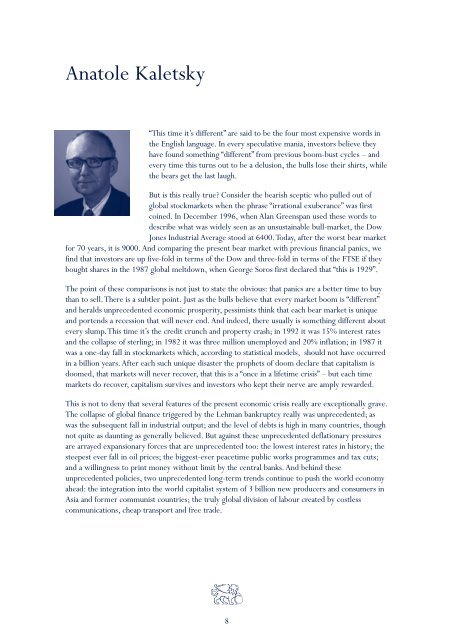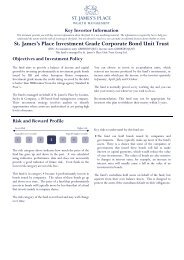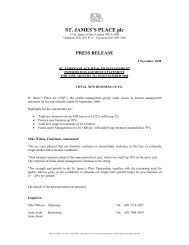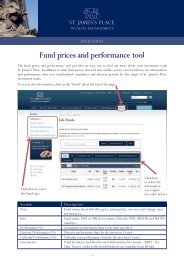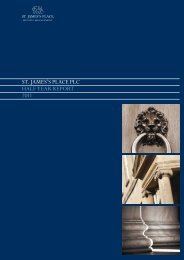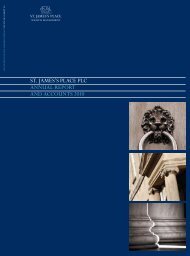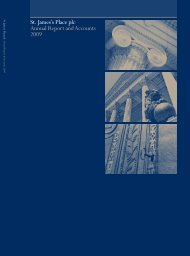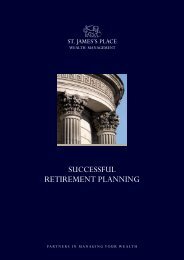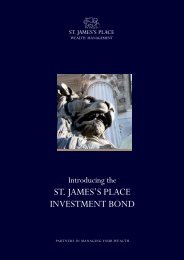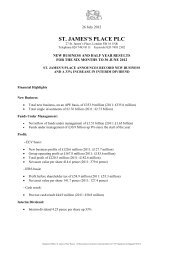Report of the Investment Committee 2008 - St James's Place
Report of the Investment Committee 2008 - St James's Place
Report of the Investment Committee 2008 - St James's Place
Create successful ePaper yourself
Turn your PDF publications into a flip-book with our unique Google optimized e-Paper software.
Anatole Kaletsky“This time it’s different” are said to be <strong>the</strong> four most expensive words in<strong>the</strong> English language. In every speculative mania, investors believe <strong>the</strong>yhave found something “different” from previous boom-bust cycles – andevery time this turns out to be a delusion, <strong>the</strong> bulls lose <strong>the</strong>ir shirts, while<strong>the</strong> bears get <strong>the</strong> last laugh.But is this really true? Consider <strong>the</strong> bearish sceptic who pulled out <strong>of</strong>global stockmarkets when <strong>the</strong> phrase “irrational exuberance” was firstcoined. In December 1996, when Alan Greenspan used <strong>the</strong>se words todescribe what was widely seen as an unsustainable bull-market, <strong>the</strong> DowJones Industrial Average stood at 6400. Today, after <strong>the</strong> worst bear marketfor 70 years, it is 9000. And comparing <strong>the</strong> present bear market with previous financial panics, wefind that investors are up five-fold in terms <strong>of</strong> <strong>the</strong> Dow and three-fold in terms <strong>of</strong> <strong>the</strong> FTSE if <strong>the</strong>ybought shares in <strong>the</strong> 1987 global meltdown, when George Soros first declared that “this is 1929”.The point <strong>of</strong> <strong>the</strong>se comparisons is not just to state <strong>the</strong> obvious: that panics are a better time to buythan to sell. There is a subtler point. Just as <strong>the</strong> bulls believe that every market boom is “different”and heralds unprecedented economic prosperity, pessimists think that each bear market is uniqueand portends a recession that will never end. And indeed, <strong>the</strong>re usually is something different aboutevery slump. This time it’s <strong>the</strong> credit crunch and property crash; in 1992 it was 15% interest ratesand <strong>the</strong> collapse <strong>of</strong> sterling; in 1982 it was three million unemployed and 20% inflation; in 1987 itwas a one-day fall in stockmarkets which, according to statistical models, should not have occurredin a billion years. After each such unique disaster <strong>the</strong> prophets <strong>of</strong> doom declare that capitalism isdoomed, that markets will never recover, that this is a “once in a lifetime crisis” – but each timemarkets do recover, capitalism survives and investors who kept <strong>the</strong>ir nerve are amply rewarded.This is not to deny that several features <strong>of</strong> <strong>the</strong> present economic crisis really are exceptionally grave.The collapse <strong>of</strong> global finance triggered by <strong>the</strong> Lehman bankruptcy really was unprecedented; aswas <strong>the</strong> subsequent fall in industrial output; and <strong>the</strong> level <strong>of</strong> debts is high in many countries, thoughnot quite as daunting as generally believed. But against <strong>the</strong>se unprecedented deflationary pressuresare arrayed expansionary forces that are unprecedented too: <strong>the</strong> lowest interest rates in history; <strong>the</strong>steepest ever fall in oil prices; <strong>the</strong> biggest-ever peacetime public works programmes and tax cuts;and a willingness to print money without limit by <strong>the</strong> central banks. And behind <strong>the</strong>seunprecedented policies, two unprecedented long-term trends continue to push <strong>the</strong> world economyahead: <strong>the</strong> integration into <strong>the</strong> world capitalist system <strong>of</strong> 3 billion new producers and consumers inAsia and former communist countries; <strong>the</strong> truly global division <strong>of</strong> labour created by costlesscommunications, cheap transport and free trade.8


